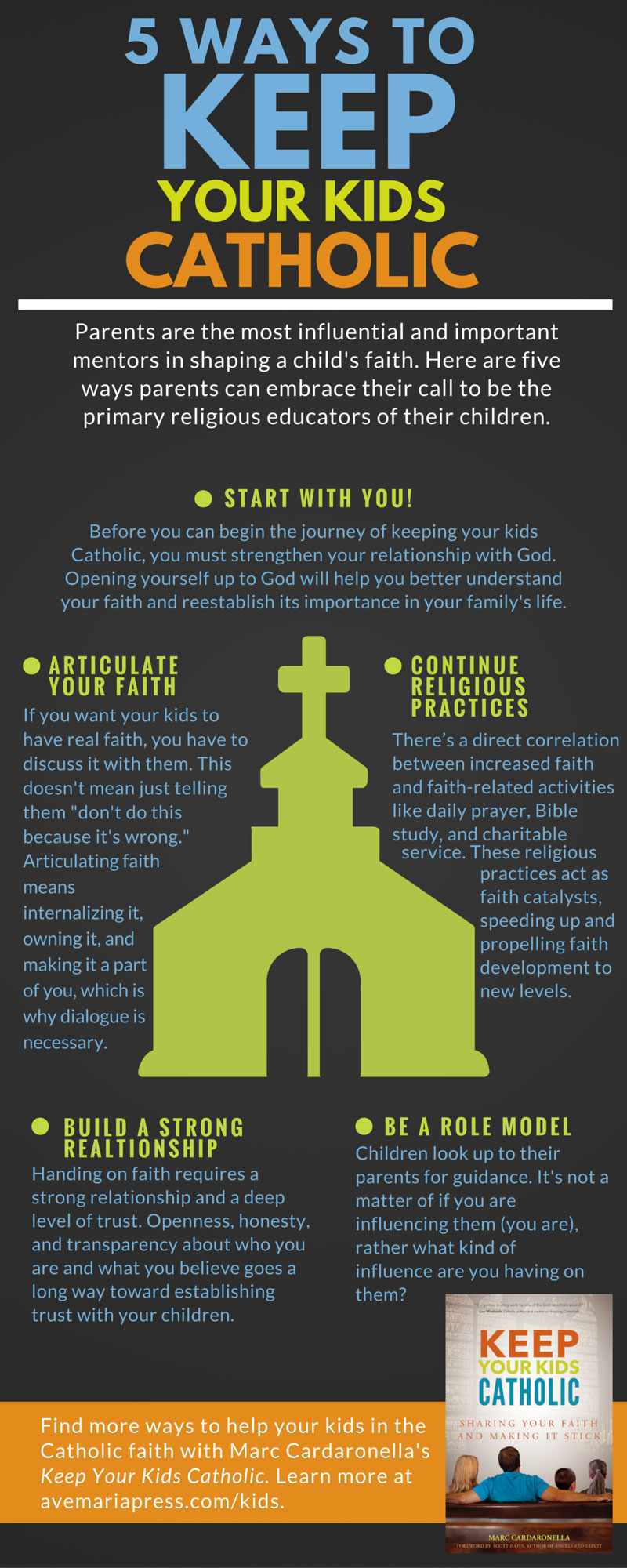Parents, want to know the secret to keeping kids Catholic?
Get involved in their religious formation.
This isn’t a new idea. The Church has said it for decades.
The Vatican II documents say parents are the “first preachers of the faith” to their children, and their influence is “incapable of being entirely delegated to others or usurped by others.” Yet for the most part, parents don’t know how to do faith formation and parishes don’t help them.
In my new book Keep Your Kids Catholic: Sharing Your Faith and Making it Stick, I argue that parents are indispensable in the process of handing on faith to children. And, there’s scientific research to prove it!
From 2002 to 2005, sociologists Christian Smith and Melina Lundquist Denton, conducted a nationwide study of teen religious involvement. Their findings are reported in Soul Searching: The Religious and Spiritual Lives of American Teenagers.
Here are four ways, drawn from Smith and Denton’s research, that parents prove essential and irreplaceable for keeping kids catholic.
1. Keeping kids Catholic through influence
Near my house there was a billboard I saw every day. It was the image of a rear-view mirror and in it you could see the face of a sad little girl looking up at you from the backseat.
The caption read something like, “Even when you’re not talking to her, you’re teaching her. Calm down when you’re behind the wheel.”
Ouch! That one used get me because I’m not the calmest (or cleanest-mouthed) driver. It also got me thinking about other areas in my life where I wasn’t a good role model.
Parents matter…a lot! In fact, according to Smith and Denton, it’s not a question of if you are influencing them but what kind of influence you are having. If you’re not careful, it could be negative.
So, lesson #1 for keeping kids Catholic is be a good role model.
“For in the end,” Smith and Denton explain, parents “most likely will get from teens what they as adults themselves are.”
2. Keeping kids Catholic through relationship
Handing on faith effectively requires a strong relationship and deep level of trust. Otherwise, your efforts fall on deaf ears.
The rapport and intimacy you have with your children, poises you perfectly to teach them about life from a religious perspective. Think about that, you can affect them in ways no one else can.
You speak to your kids about sports and movies, you advise them on school and careers, why not teach them about religion? My guess most parents would say because it’s uncomfortable.
I get that. The little voice in your head says you’re too “out of touch” to reach your kids after a certain age, and it’s better to turn them over to the “experts” at the parish. That little voice is wrong.
“Parents,” Smith and Denton write, “need . . .to develop more confidence in teaching youth about their faith traditions and expecting meaningful responses from them.” They found that deep down kids are willing to be taught by parents…even though they don’t act like it.
If you can extend your comfort zone, you have the potential to influence your kids in profound ways.
3. Keeping Kids Catholic through articulation
Here’s another interesting thing that surprised Smith and Denton, teens across the board had a hard time articulating their faith. They easily discussed opinions on drinking, doing drugs, or avoiding STDs, but couldn’t explain their faith in God.
I think it’s because their parents talked to them at length about the consequences of a DUI or loss of virginity, but remained silent about the eternal consequences of a mortal sin or loss of faith?
If you want your kids to have real faith, you have to discuss it with them. And, that doesn’t mean just telling them “don’t do this because it’s wrong.” Your parental relationship puts you in a unique position to do this.
Articulating faith means internalizing it, owning it, and making it a part of you. That requires dialogue.
Above all else the faith must be something personal, not abstract. They must reflect on how a topic affects them, in their lives, not just how it affects people in general.
4. Keeping kids Catholic through religious practices
There’s a direct correlation between increased faith and faith-related activities like daily prayer, Bible study, and charitable service. These religious practices act as faith catalysts, speeding up and propelling faith development to new levels.
Smith and Denton observed this phenomena in religiously active teens saying, “Faith for these teenagers is also activated, practiced, and formed through specific religious and spiritual practices.”
How do you get teens to do these religious practices? At some point, you have to make them. That sounds harsh, but the reality is you are responsible for forming your children in virtue.
If you don’t teach them the value of discipline, service, and time management by making them do hard things, they won’t learn it. Similarly, you have to schedule time for religious activities and build these habits into them.
When they’re young, you are the keeper of the schedule. If you wait until they’re old enough to do it on their own, they won’t.
This essential aspect of religious formation, more than any other, is dependent on parents. The school or parish can’t do this for you. They may schedule the events, but you must get your kids there.
It’s time to turn the tide
Most Catholic parents aren’t interested in being a part of their children’s faith formation. I understand. We’re all busy and none of this is easy. However, our kids are leaving the Church once they leave the house, and at that point we’re nearly powerless.
The current religious education system is largely failing, but we’re asking it to do too much. The most effective aspects of faith formation need the involvement of parents.
We can turn this around, but it’s going to take a shift in thinking–a partnership between parish and parents.
When we parents take our rightful place in our children’s faith formation, by doing what only we can do, we will be successful in keeping our kids Catholic.
Note: This article was originally posted on CatholicMom.com.
Infographic courtesy of Heather Glenn, Ave Maria Press.


